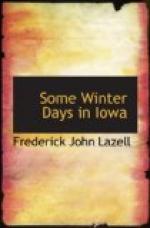But no one need be ashamed to confess an ignorance of botany. Botanical ignorance is more common than poverty. It has always been prevalent. And the cause of it may be traced back to the author of all our short-comings, old Adam. We read that every beast of the field and every fowl of the air were brought to Adam to see what he would call them; and whatsoever Adam called every living creature, that was the name thereof. But why, oh why, didn’t he name the trees? If he had known enough of the science to partake of the fruit of the tree of life he might have lived long enough to write a systematic botany, satisfactory alike to the Harvard school of standpat systematists and their manual-ripping rivals in nomenclature. But he didn’t; and no one else may ever hope to do it.
Eve had never read a book on how to know the wild fruits, and her first field work in botany had a disastrous termination; it complicated the subject by the punishment of thorns and thistles. Cain’s conduct brought both botany and agriculture into disrepute. Little more is heard until Pharaoh’s daughter went botanizing and found Moses in the bulrushes. Oshea and Jehoshua showed some advancement by bringing back grapes and figs and pomegranates from the brook Eschol as the proudest products of the promised land. But Solomon was the only man in the olden times who ever knew botany thoroughly. We are told that he was wiser than all men. “Prove it,” says some doubting reader, moving for a more specific statement. So the biographer adds: “He spake of trees, from the cedar that is in Lebanon even unto the hyssop that springeth out of the wall.”
Four centuries later, Daniel, Shadrach, Meshach, and Abednego anticipated Emerson’s advice about eating bread and pulse at rich men’s tables. The historian tells us that they were men skilful in all wisdom, cunning in knowledge, and understanding science. Possessing such wisdom, Daniel knew it would be easy to mix up the wicked elders who plotted against the virtue of the fair Susanna by asking them a question of botany. One said he saw her under a mastick tree and the other under a holm tree. This gave Shakespeare that fine line in The Merchant of Venice, “A Daniel come to judgment; yea, a Daniel.” But in these latter days we rarely read the story of Susanna, and Shakespeare’s line is not understood by one play-goer in fifty.
When the diminutive Zaccheus climbed into a shade tree which graced a town lot in Jericho he gave the translators for “the Most High and Mighty Prince James” another puzzle, for they put him on record as going up into a sycamore tree. We had always supposed that this was because the sycamore’s habit of shedding its bark made smooth climbing for Zaccheus. But scientific commentators tell us now that it was not a sycamore tree, but a hybridized fig-mulberry!
* * * * *




